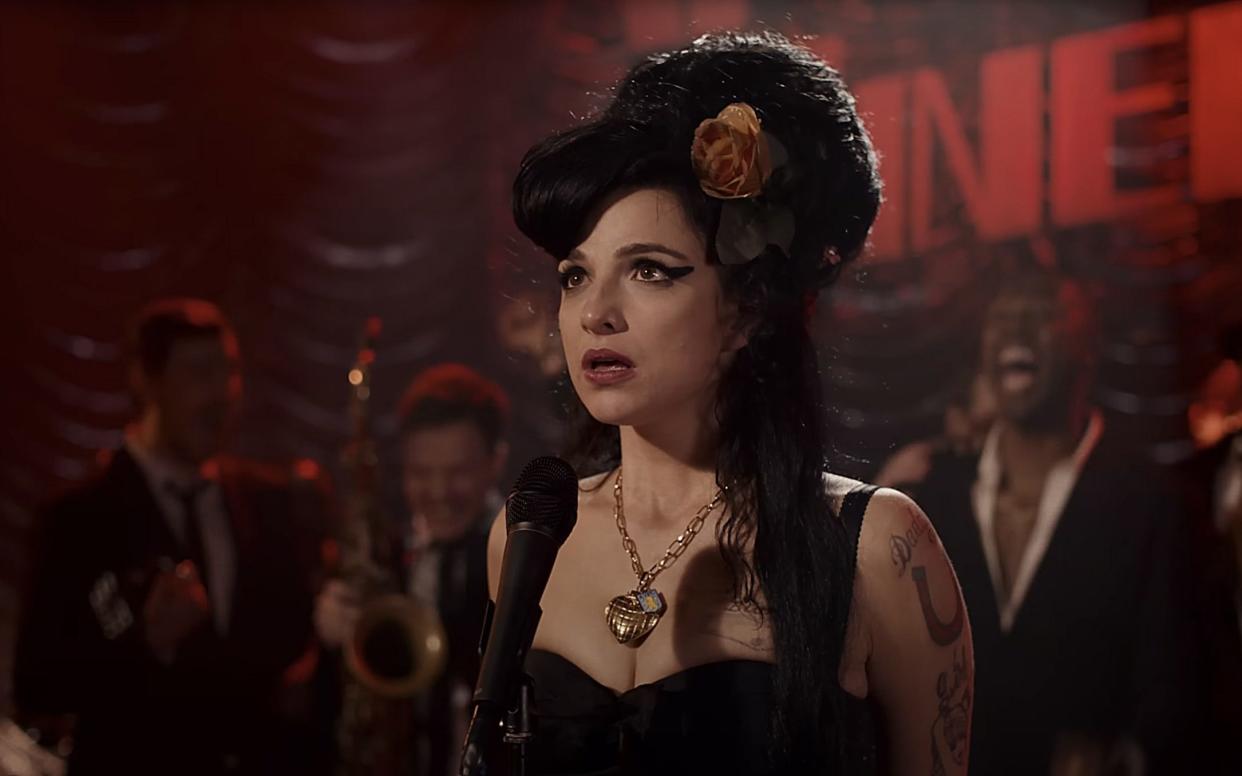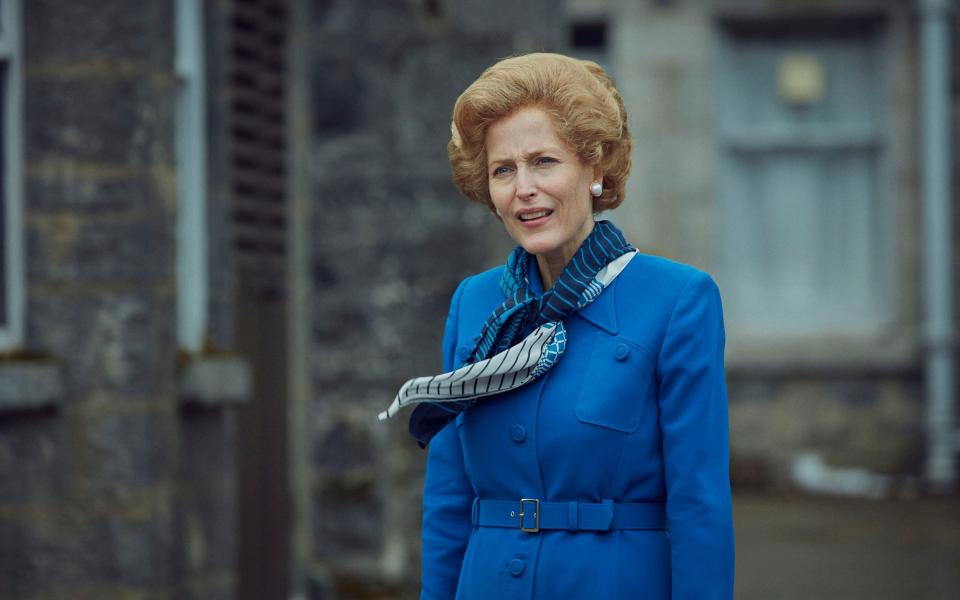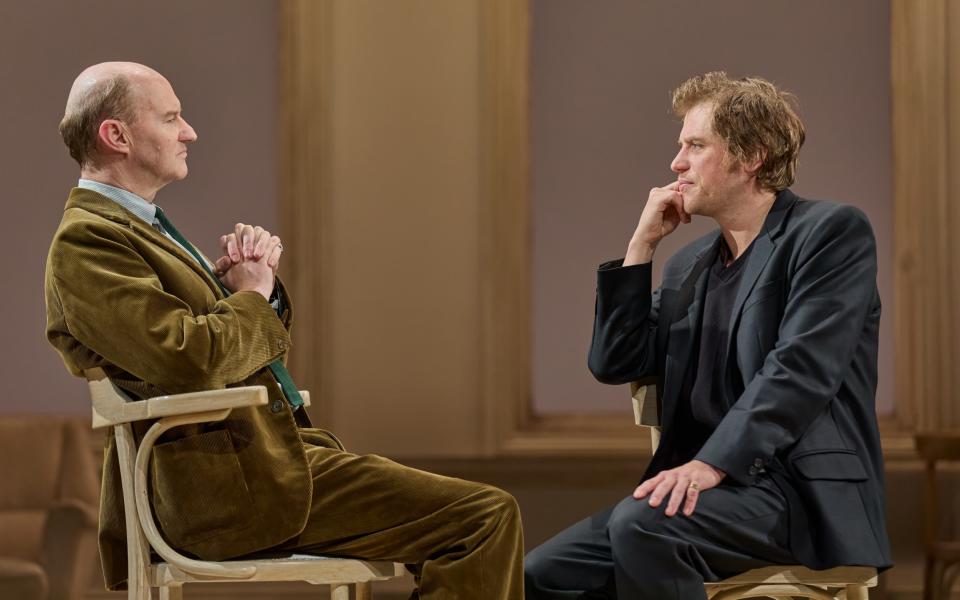Critics of Back to Black should remember the best biopics offer nuance, not caricature

- Oops!Something went wrong.Please try again later.
- Oops!Something went wrong.Please try again later.
The reviews are in for Back to Black, the new film about Amy Winehouse’s life, and – as is customary for a biopic – the emphasis has been less on the film’s quality than on the verisimilitude of its performances. Some controversy emerged last month when fans criticised the decision not to use the late singer’s voice for the music scenes, while those who knew her have complained that director Sam Taylor-Johnson renders her life like a fairy tale. Marisa Abela’s portrayal of Winehouse, however, has generally been described as warm and engaging; the Telegraph’s film critic Tim Robey said that she “approximates that smoky yowl pretty well”.
It was a tough gig for Abela. Winehouse is such a revered figure that her acolytes were always going to have trenchant opinions – to the extent that you wonder why any actor dares take on such a role when opprobrium feels inevitable. But biopics are big business, not just in cinema, but on TV and in theatre too. Their commissioning makes sense in an age of fragmented cultural experience, where you have to ensnare potential viewers with a known story or brand. There are several in the works: Timothée Chalamet as Bob Dylan, Tom Holland as Fred Astaire and Daisy Edgar-Jones as Carole King. Musical stars are the most lucrative subjects: they come with the largest fanbases.
The history of the biopic shows evidence of the good (Joaquin Phoenix as Johnny Cash in Walk the Line), the bad (Naomi Watts in Diana) and the ugly (John Hurt in The Elephant Man). But what makes a good performance? Certainly, an obsessive attention to detail often reaps rewards. Those who saw Maestro and were able to see past Bradley Cooper’s prosthetics as Leonard Bernstein will have been rewarded with a meticulous representation, as if Cooper had been locked inside a bunker for a year and surrounded by large monitors that displayed Bernstein conducting Mahler’s 2nd.
Sometimes, however, that search for perfection can make the performer come unstuck – particularly if they aim to become a physical doppelgänger. Gillian Anderson’s performance as Margaret Thatcher in The Crown, a performance that she has now reheated to play Emily Maitlis in Scoop, was so beholden to the speech and mannerisms of the Iron Lady that you couldn’t see past the studied stiffness.
Thatcher, in fact, often poses a problem for actors. Too many are stuck with the image of a Fluck and Law puppet in their heads and, given that many directors are of a Leftist persuasion, seem persuaded to veer towards caricature. Neither Meryl Streep nor Lindsay Duncan quite managed to pull it off. Only Andrea Riseborough, playing a young Maggie in the excellent 2008 TV biopic The Long Walk to Finchley, found some emotional truth – probably because she was playing Thatcher before the voice-coaching lessons kicked in.

There’s also the familiarity problem. I’ve always admired Helena Bonham Carter, but seeing her in The Crown, I never once believed she was Princess Margaret, but rather Helena Bonham Carter transported to 1970s Mustique. That is why it’s so much easier to invest in Austin Butler as Elvis, or Sam Riley as Ian Curtis (in Control): you didn’t know these actors beforehand, so they were essentially blank canvases onto whom you could project your own thoughts about the people they were playing. Over-familiarity with the subject can be as much of a problem as over-familiarity with the actor, which is why I fear that Chalamet’s impersonation of Dylan will be a grab-bag of “iconic” moments from the folk singer’s early life.
Biopics are especially fraught these days, because simply to be a brilliant actor isn’t necessarily enough to get you cast. “Lived experience” is the phrase denoting the idea that an actor must share the ethnicity of their subject – the casting of both Cooper as Bernstein and Helen Mirren as Golda Meir were criticised – and, if possible, the same background. Admittedly, it’s hard to find Francophone actors with experience of martyrdom, which is presumably why Milla Jovovich was cast as Joan of Arc.
Cultural sensitivity is understandable, but those who fret about such things should note that if we had been too zealous about the parameters, we would never have had the crown of Michael Douglas’s career, when the very straight actor played the very gay Liberace in Behind the Candelabra, nor would we have had Taron Egerton as Elton John in Rocketman for the same reason.

Sometimes, the best biopics have been on stage. I wish I had been old enough to see Jane Lapotaire as Edith Piaf in Pam Gems’s play, apparently one of the most heart-stoppingly intense performances ever committed to the theatre. I’m old enough to have caught Antony Sher in another Gems biopic, Stanley, and was fascinated by how he drew such a full-blooded portrait of Stanley Spencer – someone who, to my knowledge, had never been in front of a TV camera.
But I think theatre is at an advantage in some ways. Placing someone far away on a stage allows them less obsessive scrutiny from the viewer, and they have the room to develop their interpretation. A recent example is Johnny Flynn, who played Richard Burton in the National’s The Motive and the Cue. Flynn looks unlike Burton, nor sounds particularly like him, yet the physical distance means that it doesn’t matter. The performance works because Flynn has delved into Burton’s psyche and found the essence of his personality. That, I think, is the goal for any biopic star. Next time the social-media mob start whining about a performer’s lack of total fidelity, as with Back to Black), they should remember that less is more.

